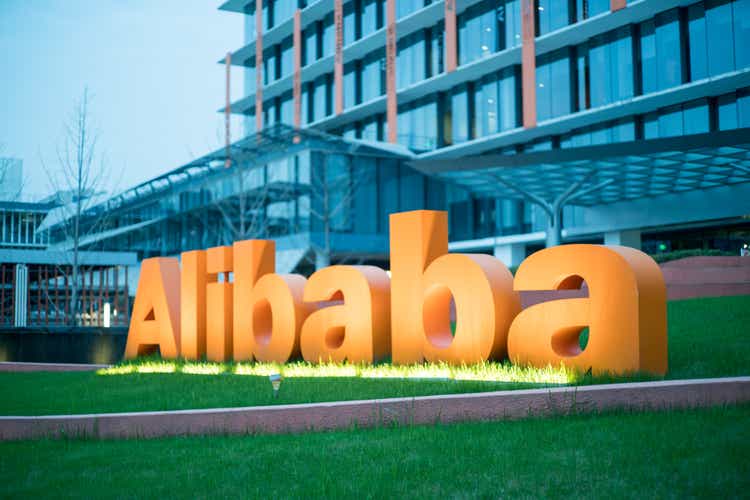
maybefalse/iStock Unreleased through Getty Photographs
Introduction
Alibaba Group Holding Ltd. (NYSE:BABA) is a Chinese language multinational firm that makes a speciality of retail and e-commerce. It additionally has branches within the web know-how, cellular media, movie, and leisure industries. The inventory has carried out fairly nicely in current months, experiencing a 5.67% enhance since December of 2022, with a excessive of 120.57 USD in January of 2023. Alibaba is rated as a purchase with a forecasted twelve-month excessive of 181.00 USD and a low of 115.00 USD from its present 92.10 USD. With quite a lot of strategic maneuvers, acquisitions, and inner modifications on the horizon, Alibaba is a robust purchase.
Firm Overview

Statista
The Alibaba Group primarily operates within the Chinese language retail and e-commerce sectors with their on-line procuring platforms Tmall and Taobao, which make up for 67% of the corporate’s income. It additionally has a big presence in cloud computing, logistics, and the worldwide e-commerce and retail sectors, making up a mixed 21% of its income. The corporate additionally has a small however rising presence within the digital media and leisure trade, sponsoring the Chinese language video streaming service Youkou Toudou and Alibaba Music. Many analysts nonetheless see this phase as a cash pit, as they pale compared to Chinese language giants Baidu (BIDU) and Tencent (OTCPK:TCEHY), which sponsor way more in style video streaming platforms.
Trade Overview
The International retail e-commerce trade is anticipated to develop at a CAGR of 11.3% within the interval from 2023 to 2027. The Chinese language retail e-commerce trade is anticipated to develop at a CAGR of 12.36% in the identical interval. The Chinese language e-commerce market generates 50% of the world’s e-commerce transactions by quantity, and additional is anticipated to develop to three.56 trillion USD by subsequent yr.
Aggressive Evaluation
Alibaba continues to dominate the Chinese language retail e-commerce market, having a 50.8% market share. Alibaba’s e-commerce subsidiaries, Tmall and Taobao, account for almost 50% of all parcel deliveries in China. By means of Tmall and Taobao, the corporate is ready to management the gross sales of each title model and non-name model, merchant-sold merchandise respectively. Their mixed transactions generated over 163 billion USD final yr alone. Alibaba’s closest opponents are JD.com and Pinduoduo, which management 15.9% and 13.2% of the Chinese language market respectively. These firms, though fairly substantial in development and market share, merely lack the close to monopoly Alibaba holds over the Chinese language retail e-commerce market. With development outpacing analyst predictions, Alibaba is anticipated to carry this aggressive command over the Chinese language market for a very long time.

Statista
Financials
Alibaba reported a income of 868.69 billion Yuan within the final fiscal yr (as of March 31st 2023) or roughly 126.49 billion USD. Their e-commerce subsidiaries generated the majority of the revenue, round 582.73 billion yuan, or roughly 81.77 billion USD. Alibaba additionally reported a Q1 2023 income of roughly 29.62 billion USD, a 2% YoY enhance, and a rise of 38% in web income from Q1 2022. Along with these metrics, Alibaba’s worldwide retail sector grew 15% in orders and 41% in income, which is anticipated to extend additional with the launch of Selection, a service offering cost-effective options and merchandise for patrons. The corporate additionally reported Q1 working bills of roughly 28.1 billion USD, a 1% of income YoY enhance. This quantity is anticipated to extend as Alibaba spends extra into AI analysis and growth following its primary competitor on this sector, Baidu.

BusinessWire
Catalysts for Progress
Alibaba has a strong basis inside the Chinese language retail e-commerce market; as such, other than the projected development of the aforementioned, extra catalysts for Alibaba’s inventory development come primarily from investments into different subsidiaries by means of inner modifications to the corporate’s holdings. Alibaba’s grocery-shopping arm, Freshippo, for instance, seeks to finish its IPO inside a yr, a part of the corporate’s bigger reform initiative. Alibaba’s logistics arm, Cainiao Good Logistics has additionally been given the inexperienced gentle to hunt an IPO. Alibaba’s inventory worth elevated by 14% when the corporate introduced its intention to separate its key holdings into bigger, extra organized subsidiaries, specifically into e-commerce, native companies, sensible logistics, world e-commerce, and leisure and digital media sectors. With a potential future IPO for subsidiaries, and lesser bills into what many buyers have described as a cash pit, Alibaba has large potential for development on this regard.
Valuation
Alibaba at present has a ahead P/E ratio of 10.08, indicating a reasonably good expectation for development. The corporate additionally has a trailing P/E ratio of 24.09, indicating excellent development up to now yr. Alibaba additionally has a five-year annualized earnings development price of 11%, a powerful price in comparison with different firms. Though metrics have indicated a lower in development Alibaba in current quarters, that is certain to extend as the corporate splits its subsidiaries and takes and will increase market share in key sectors, notably logistics. As well as, the mixture of the projected development of the Chinese language shopper market and Alibaba’s dominating measurement over the retail e-commerce sector will result in sizable development sooner or later. Alibaba’s market capitalization at present stands at roughly 236 billion USD. The corporate’s capitalization has been as excessive as 648.31 billion USD, and has regularly been larger than its present worth. The mix of things acknowledged signifies a low present valuation, and that the corporate’s true worth could also be larger than it’s.

Y Charts
ESG metrics
Alibaba has made important strides in recent times to succeed in benchmark ESG objectives. The corporate aligns itself to the UN’s 2030 Sustainable Improvement Objectives (SDGs). They’ve additionally aligned themselves towards restoring the local weather, enabling a sustainable digital financial system and social sphere, and fueling small companies, amongst different objectives. Alibaba’s main technique to succeed in their ESG targets is through communication with stakeholders and thru charitable donations the corporate makes on this regard. General, the corporate is rated as a BBB, or common, MSCI by way of ESG, notably within the fields of labor administration and carbon emission management.
Dangers and Issues
Being a multinational Chinese language firm, Alibaba has to take care of shut relationships with each overseas regulators and the Chinese language authorities. The latter relationship can show risky at finest and might trigger an organization to fold totally at worst. The Chinese language authorities seeks to carry energetic regulatory roles even in non-public firms, which might show regarding for a corporation like Alibaba. Moreover, financial circumstances and volatility, particularly with regard to China’s relationships on the world stage can immediately have an effect on the corporate’s cross border e-commerce initiatives, which account for a big quantity of projected future development. Along with this, political modifications, similar to sanctions and tensions can have an effect on Alibaba’s inventory worth.
These issues, nonetheless, pale compared to a a lot greater threat: knowledge theft. China’s Nationwide Intelligence and Knowledge Safety legal guidelines have made it vital for Chinese language firms to adjust to Chinese language knowledge assortment insurance policies. This has already proved an issue for nations like Australia, which have barred Huawei, amongst different firms, from putting in know-how inside their nation. As a Chinese language firm, Alibaba can also be compelled to adjust to these authorized bindings, and thus safe knowledge assortment for overseas prospects continues to be a problem which can considerably harm Alibaba’s worldwide growth tasks sooner or later.
Conclusion
Alibaba controls a big share of the Chinese language retail e-commerce market, with a lot of its opponents trailing behind. Alibaba’s future development is a operate of its non-ecommerce subsidiaries and the way they will adapt and evolve to the evolving Chinese language shopper market, in addition to the rising market itself. With important investments into every of those ventures, notably on the subject of its wonderful logistics arm, nonetheless, Alibaba is anticipated to even outpace investor expectations as its inner unitary reforms proceed.
Analyst Suggestion By: Ratul Chakraborty
